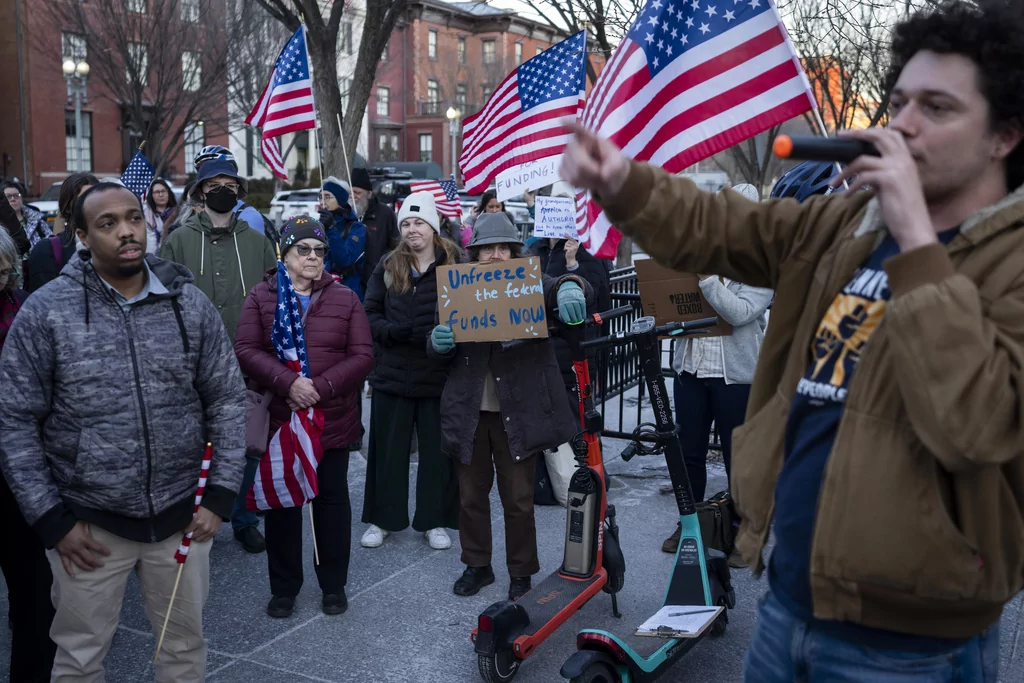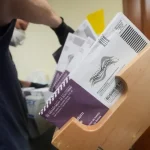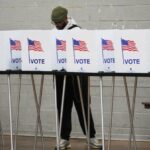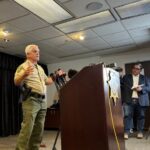
A federal judge on Monday extended an order blocking the Trump administration from enforcing a sweeping freeze on federal grants, rejecting arguments from the Department of Justice that the case had become moot following the withdrawal of an Office of Management and Budget directive.
U.S. District Judge Loren AliKhan, ruling from Washington, D.C., granted a temporary restraining order against the aid freeze, siding with a coalition of nonprofit organizations that claimed they were still unable to access federal funds despite the government’s insistence that the OMB memo was no longer in effect.

The decision follows an administrative stay she issued last week that was set to expire by 5 p.m. Monday, and comes as a separate Rhode Island federal judge ruled Friday to block the Trump administration’s freeze of various federal spending programs tied to his executive orders.
During the hearing Monday morning, AliKhan appeared to reject the DOJ’s arguments that an existing block from the federal court in Rhode Island was sufficient reason for her to stand aside.
President Donald Trump’s DOJ maintained that the funding pauses in question stemmed not from the now-rescinded OMB memo but from executive orders issued by Trump. DOJ attorney Daniel Schwei contended that any remaining funding restrictions were lawful and tied to presidential directives, such as a 90-day pause on certain grants and federal aid to migrants.
“Just because funding may be paused, that does not mean that it is attributable to the now-withdrawn OMB memo,” Schwei argued.
Despite the administration’s position, AliKhan determined that the plaintiffs, comprising nonprofit groups and health organizations, had demonstrated that some funds remained inaccessible even though they fell outside the scope of Trump’s executive orders. She cited sworn affidavits from small businesses and organizations that had been unable to retrieve federal dollars, including a scientific research firm that had no clear connection to the policies underlying the administration’s funding freeze.
“Organizations that have nothing to do with the executive orders, that do things like install wheelchair ramps or support small businesses, have seen a risk of laying people off and potentially completely collapsing because they’re not receiving the funds,” AliKhan said, signaling that the plaintiffs had met the legal standard for emergency relief.
Washington was sent into confusion last week after OMB issued a memo directing federal agencies to put a hold on all spending other than Medicare and Social Security, although the White House has also said it does not impact other programs, such as loan forgiveness or student aid.
Following an outcry, OMB withdrew the memo, but hours later, White House press secretary Karoline Leavitt contended that the withdrawal of the memo had no effect on the spending freeze, which she said was still in effect.
DOJ signals readiness for higher court review
While the DOJ cannot immediately appeal the restraining order, Schwei unsuccessfully pressed AliKhan to rule on a preliminary injunction instead, a move that would allow the administration to take the case to the U.S. Court of Appeals for the District of Columbia Circuit.
“We think this is a proceeding of the type that resembles a preliminary injunction proceeding,” Schwei said, adding that if AliKhan granted “extraordinarily broad relief,” the government should have the ability to seek an appeal, pending authorization from the Solicitor General. He also requested that the judge issue an administrative stay of her order to give the government time to pursue emergency relief.
Federal rules do not allow the appeal of restraining orders, as they are temporary measures meant to maintain the status quo until a hearing on a preliminary injunction.
A broader effort to jumpstart Trump’s budget agenda
The legal dispute bears on a theory espoused by some Trump advisers that the Impoundment Control Act of 1974, which limits the president’s ability to directly control spending, is not constitutional. They argue that presidents should have greater discretion over federal expenditures. The president’s unilateral freeze on certain grants and loans was an early test of that theory, sparking fierce pushback from Democrat-led states and advocacy groups.
The controversy has also heightened opposition to Trump’s nominee to lead OMB, Russ Vought. Senate Democrats boycotted a vote last week to advance his nomination, citing concerns over the administration’s handling of the funding freeze, though Republicans still moved the process forward.
CLICK HERE TO READ MORE FROM THE WASHINGTON EXAMINER
While Vought is expected to be confirmed, the dispute over the funding pause is likely to reach higher courts, where the administration will attempt to defend its approach as a legitimate exercise of executive power.
The Washington Examiner contacted representatives with the White House for response.








Bet it was a judge who doesn’t like Trump.
REMOVE this JUDGE NOW. he is Obviously a Traitor or just another Communist DemonRat.
If Biden appointed Judges become a problem rath the a solution then executive branch authority can shut down those wasteful branches, too many democrat transaction without the approval of Congress or the American Tax payers.